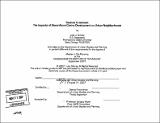Casinos in context : the impacts of stand-alone casino development on urban neighborhoods
Author(s)
Schray, Luke J. (Luke Joseph)
DownloadFull printable version (23.69Mb)
Other Contributors
Massachusetts Institute of Technology. Dept. of Urban Studies and Planning.
Advisor
Dennis Frenchman.
Terms of use
Metadata
Show full item recordAbstract
As the stigma of gambling fades and governments seek more sources of revenue the urban casino is becoming more common. Many of these are legalized to operate with limited competition in their state, standing alone in their respective city. while the general, diffuse impacts of casinos have been well studied, the paucity of casinos in urban settings has left a gap in the understanding of how stand-alone casinos affect their urban context. This thesis seeks to fill this gap by analyzing three of the oldest stand-alone urban casinos in the United States: Harrah's Casino in Joliet, Harrah's Casino in New Orleans, and Greektown Casino in Detroit. The thesis analyzes the impact of each of these casinos through the lens of five categories of impact: urban design of the neighborhood, city investment, real estate development, street-level commerce, and the residential community. The resulting analysis finds that casinos tend to be insular entities that do not impact much outside their own footprint. Their greatest potential for external impacts is an ability to act as an anchor for street-level commerce in a neighborhood if designed properly, a trend that has been observed for some time in resort communities with fake interior streets. The essay concludes with recommendations on how a city might engender a similar phenomenon.
Description
Thesis (M.C.P.)--Massachusetts Institute of Technology, Dept. of Urban Studies and Planning, 2007. Includes bibliographical references (p. 169-174).
Date issued
2007Department
Massachusetts Institute of Technology. Department of Urban Studies and PlanningPublisher
Massachusetts Institute of Technology
Keywords
Urban Studies and Planning.